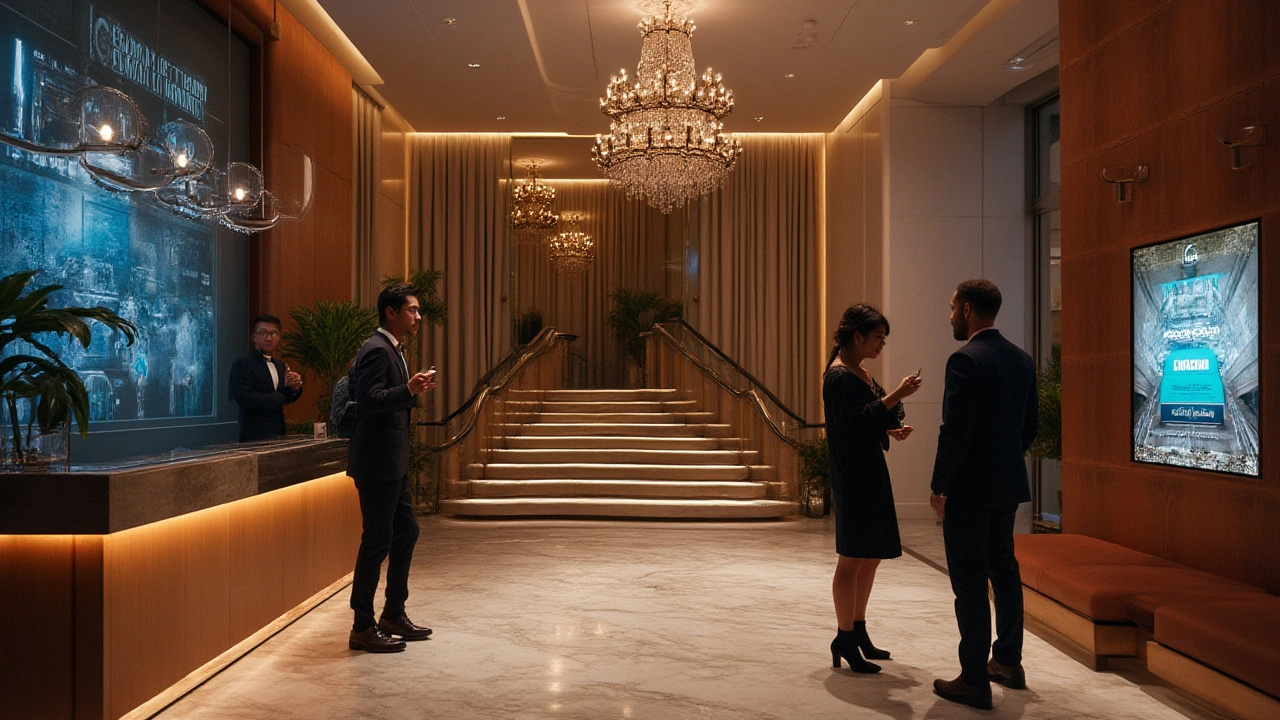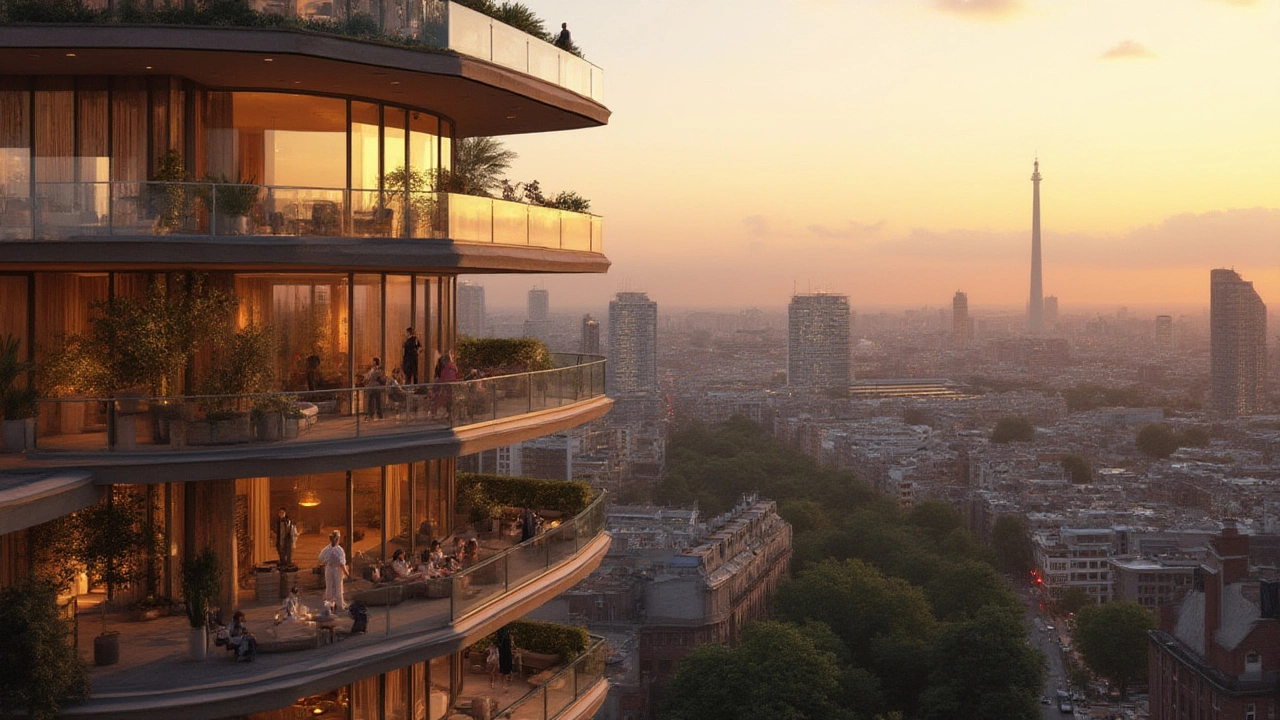Picture this: Both buildings sparkle in the sun, standing tall with glassy exteriors, maybe a rooftop pool, maybe a doorman who knows your dog’s name (Rex, in my case). Yet, two people at that curb may talk about their homes very differently. One owns a slice of sky; the other rents it. That’s the split between luxury condos and apartments—it’s more than just designer faucets or marble lobbies. Huge sums change hands, reputations ride on features, but when you strip away the velvet, it’s the legal and lifestyle differences that actually make or break the deal. Don’t be fooled by a fancy mailbox—let’s break down what really separates these two real estate heavyweights.
What Is a Luxury Condo—and How Is It Different from an Apartment?
Here’s the truth: from the outside, it’s almost impossible to tell a luxury condo from a luxury apartment. Both can share the same shiny facades, have equally Instagrammable rooftop terraces, or offer views that make your morning coffee taste better. But the moment you get the keys—and who actually gives them to you—the difference pops out. In a condo, you’re the boss of your unit. You own your bit of the building, from the walls in. With an apartment (no matter how glam), you’re a tenant renting the space from a landlord or company. That difference sets off a chain reaction: how you deal with maintenance, what freedoms you have, and what kind of bills show up in your mailbox each month.
Ownership in a condo is a big deal. I’ve seen friends agonize over paint colors and kitchen tiles because, well, once you own it, the money you pour in comes back—sometimes, hopefully—in resale value. Try repainting a rental’s kitchen without written permission and watch your security deposit vanish. With a condo, there’s an owner association (usually called an HOA) running the building and the shared spaces, charging a monthly fee that covers everything from landscaping to security, and even—if you’re lucky—dog spas. (Rex, take note.) In an apartment, the landlord or a third-party company takes care of repairs and the common areas; you call the maintenance line if something breaks, and that’s where your responsibility ends, aside from that monthly rent.
Condos come with freedom—and rules. You get to sell, sublet, or re-design (within reason), but you have to play by the HOA’s rulebook. Want to put up a dazzling mural outside your door? That probably goes to a vote at the next board meeting. In most apartments, that’s a hard ‘no’ straight from management. Apartments, especially luxury ones, can have perks like gyms, pools, pet-washing stations, and social lounges, sometimes rivaling the amenities offered in condos. But remember, you’re a renter, not an owner, so if management wants to renovate, change policies, or even sell the building, your say is limited to what’s in your lease.
Now, cost—let’s talk numbers. Both can have steep price tags in places like Manhattan, London, or Singapore. Condos have a big one-time hit (down payment, closing costs, maybe mortgage insurance) but you own something tangible. You’ll pay HOA fees, property tax, and if there’s a pool—pool repairs when things go wrong. Apartments demand a deposit and monthly rent. Luxury rentals offer short-term flexibility (did I mention how wild rent increases can be?) but zero equity. In 2024, the median sale price of a Manhattan condo hovered around $1.1 million, while the median monthly rent for a luxury two-bedroom apartment was about $6,500. So yes, condos can feel like a mountain to climb financially, but the upside is: That mountain stays yours as long as you want.
Fun fact: In some cities, the lines blur. There are “condo-apartments”—luxury units sold individually but operated by a management company like a rental. In Miami, for instance, some luxury high-rises are part-hotel, part-condo. The result? Owners can rent their unit out when not in town, even using hotel services if they pay extra. It’s like Airbnb with a concierge in the lobby.

Amenities, Community, and Lifestyle: What’s on Offer?
Okay, let’s get down to the stuff you’ll actually use every day. When people hear “luxury,” most start dreaming about heated indoor pools, golf simulators, and maybe a chef on call. Both luxury condos and apartments deliver slick amenities—but sometimes for different reasons. Condo amenities usually get decided by a residents’ board, where owners vote on upgrades: Do we want a yoga studio or a dog run? Apartment perks come from what will help the landlord rent units faster—think BBQ decks, a Peloton room, or work-from-home pods. Both try to justify high monthly fees, but condo owners have direct financial skin in the game; they’ll think twice before approving high-cost features that won’t pay off long term.
Community in condos often feels more permanent. People stay longer because they’ve invested, literally, in their home. If you’ve ever tried to organize a block party or just share holiday cookies (Elara’s latest school-run idea), it’s easier when folks aren’t moving out every year. Apartment buildings, even high-end ones, tend toward shorter leases, so it’s hit or miss on forming new friendships. Some newer rental companies are countering with regular mixers, book clubs, or rooftop movie nights to encourage community—because let’s face it, nobody likes living in a hotel forever. But deep roots are easier to grow in buildings where people hang their hats for years.
You can expect “wow” amenities in either setting. Rooftop pools, fitness studios, dog-washing rooms (Rex is a grateful customer), mailrooms with cold storage for your groceries—all have popped up lately. In Chicago, one luxury apartment complex even installed a jam room for amateur musicians to practice. Condos get creative, too: one Miami building opened a dedicated wine tasting cellar, and another in Vancouver beefed up bike storage and repair stations to cater to the cycling crowd. The real difference? Condo amenities are typically paid for by the residents, who can lobby for changes or upgrades at annual HOA meetings. In apartments, amenities are bundled into your rent, with less say if something disappears or gets replaced.
Of course, with luxury comes service. High-end apartments often include perks like on-site management, quick repairs, high-tech security, concierge services, even pet care for busy professionals. But some of the priciest condos match (or beat) this with private elevators, personalized mail delivery, and spa treatments—sometimes available à la carte, sometimes rolled into those famous HOA fees. In rare cases, like New York’s 432 Park Avenue or London’s One Hyde Park, the building feels closer to a five-star hotel than a traditional home. But remember, the fancier the service, the steeper the cost.
Noise is one thing people rarely talk about, but it’s a common dealbreaker. Luxury apartments often advertise extra soundproofing, but unless you’re in a top-floor penthouse, you might still hear your neighbor at 2 a.m. Condos, especially new builds, tend to focus more on quality construction as it’s a selling point for buyers—not just renters. Some people notice the difference right away. If you’ve ever heard ‘yapping’ in the hallway, maybe ask for new carpeting, or invest in some white noise machines.
One more thing: Accessibility and smart tech. Luxury buildings race to outdo each other with everything from facial-recognition entry to climate control from your phone. In 2024, developers started adding electric vehicle charging stations, bike libraries, rentable tool closets, and co-working lounges for remote professionals. Condos give owners a vote (and sometimes a fight) over what gets added, while apartments might swap trendier tech every renewal cycle, hoping to stay ahead of market trends.

Making the Right Choice: Tips, Costs, and Lifestyle
The toughest question is “Which one fits my life best?” Start by thinking about time. If you plan to stick around a city long enough to justify the massive upfront costs—or want to build equity—a luxury condo might be the answer. If you’re testing out a new job, uncertain about the neighborhood, or want to avoid the hassle (and expense) of homeownership, a luxury apartment’s flexibility is hard to beat. One real estate firm in LA shared that in 2024, average turnover for luxury apartment tenants was 14 months. Condo owners? Around 8 years. That’s a huge difference when thinking about building a future in one spot.
Expenses don’t just stop at signing. For condos, track the HOA fees like a hawk—they can rise fast, especially if the building votes to tackle a costly renovation. There’s also property tax (which can spike quickly in hot markets), homeowner’s insurance, and sometimes special assessments if big repairs come up. Apartments bundle most things in with rent. But, check if utilities, parking, or storage are extra. Landlords may also hike rent when your lease ends—sometimes hundreds of dollars more, just to match the current market. I’ve known folks who spent ages customizing a rental, only to be forced out by steep rent hikes a year later, sending that investment straight down the drain.
Ask yourself: Are you cool with sharing decision-making and costs with neighbors? Condos invite you to join HOA boards, vote on spending, and deal with hairy debates over pet policies or late-night party rules. Apartments keep you mostly hands-off, but also remove some power; if management is slow fixing things, your only leverage is threatening to move.
Legal stuff? Also important. Condo purchases in 2024 saw stricter background checks than rentals in most U.S. cities—one building in Boston even required three reference letters and proof of no noise complaints. Apartment leases are usually easier to secure, but read the fine print for early exit clauses or fees for things like painting, wall mounting, or pet damages. Some luxury rentals now require pet “interviews”—yes, I’m serious; Rex wore a bow tie to his.
Don’t skip the tour. Photos lie. Visit at different times: Can you actually get in and out during rush hour? Is the lobby buzzing or silent? Are most people hauling moving boxes or walking their dogs? Pay attention to smells—the scent of strong cleaning supplies in a hallway could mean cleanliness, or that they’re hiding an issue. Ask current residents how fast problems are fixed (broken elevators can drag on for weeks if management is slow or cash-strapped).
And don’t be shy about future-proofing. Ask about upcoming developments—will a new skyscraper block your view? Is the HOA planning a big fee jump for major upgrades? Some older luxury condos miss out on things like EV charging, forcing owners to fund pricey retrofits. In rentals, check how often amenities get upgraded, and what the process is if they break. Consider resale value in condos: a sought-after address or rare view can mean the difference between pocketing a profit or waiting months for the next buyer.
It all boils down to your priorities. Are you in love with controlling your space and investing in your future? Go condo. Want to keep things simple, flexible, and avoid the drama of HOA politics? High-end apartment life might be your speed. Just keep your eyes open for what’s really “luxury.” Sometimes, the simple ability to hang a picture frame—or get your sink fixed before guests arrive—makes the biggest difference of all.
